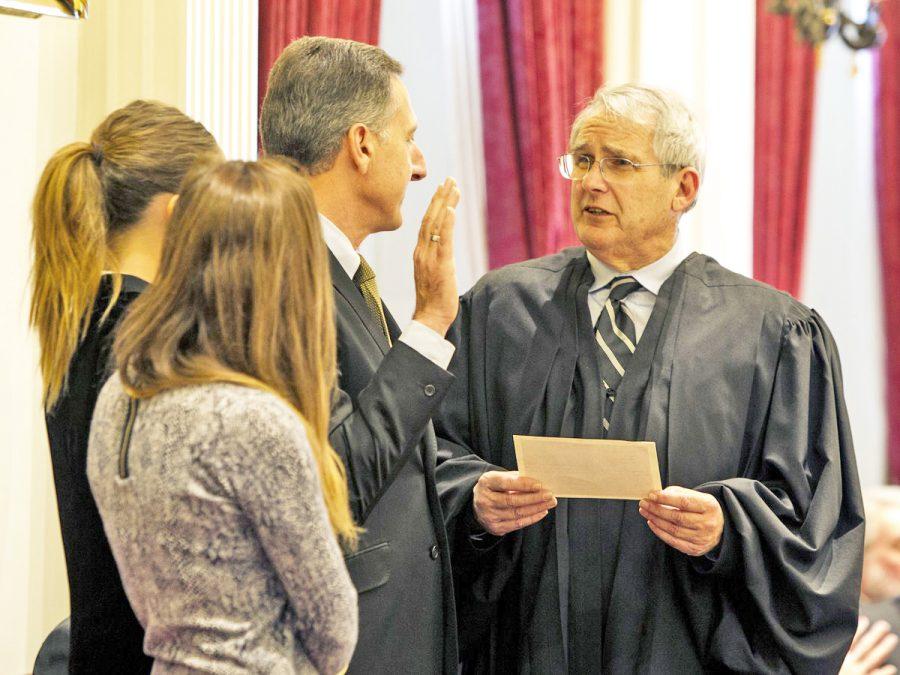Vt. Chief Justice speaks to politics class
Supreme Court Chief Justice Paul Reiber swears in Governor Shumlin
Vermont’s Supreme Court Chief Justice, Paul Reiber, visited JSC on Nov. 10 for a round robin discussion with Professor Bill Doyle’s American Politics and Government class.
After 30 years of private practice, Reiber was appointed by former Vermont Governor Jim Douglas in 2003 to serve as a part of Vermont’s Supreme Court system.
Reiber noted that this was odd because the traditional pathway to the Supreme Court is through Vermont’s courtrooms, with preference given to trial judges.
Reiber talked about some of his concerns with the more consistent cases that he has been seeing. “In this state, incidental to the explosion of opiates, you hear more about the criminal justice relationship to heroin in the press,” said Reiber. “This is a serious problem and I am very concerned about the impact on the criminal justice system as a result of that.”
Some of the opiate cases that Reiber oversees tie into family cases. “What we have seen with opiate use and addiction is a phenomenal number of cases filed in which parental neglect in extreme ways is occurring in regards to children,” he said.
With the excessive number of cases in family court throughout the state, Reiber says that Vermont has tremendous power with respect to protecting children and families.
“If there is neglect or, in the most extreme cases, physical abuse of children,” he said, “the state, through its social services people, has the power to step in and file petitions to have the rights of parents suspended or have children removed and taken into state custody.”
Time is a critical factor in these cases, Reiber said: “We need to move on these cases as rapidly as possible and our legislature has placed time limits on them. With some of these cases building up heavily in certain counties, sometimes we have a hard time meeting the deadlines.”
An additional concern that Reiber touched upon is growing lack in faith that the general public has in the problem-solving capabilities of governmental institutions. “Part of this concern stems from the fact that I think there is really not a great understanding with most of the people that you would find on the street with how government works,” said Reiber. “There is a sense across this nation right now of a lack of trust and faith in government.”
When asked about ways to solve some of these prominent current day issues in the state, Reiber said that he isn’t shy about grabbing every good idea that is brought up. “Part of what should be understood about state court systems is that the structure is very fragmented and is subject to political divisions,” said Reiber. “These divisions result in inefficiencies in a way, and I will beg, borrow and steal every good idea that I can find and thank them for it.”
When asked to talk about some of the tougher decisions that he has had to make during his time serving on the Supreme Court, Reiber noted that when your gut says to think one way and the law says to think another way, you have to follow the law because that’s the job of a judge. “We interpret the law and apply it,” said Reiber. “We are not a shadow legislature — we have fundamental principles in this country that are mirrored in every state constitution of the land.”
Reiber said that his favorite part of his job is getting opportunities to talk to students. “I talk to a lot of law students. I speak to community action groups. I love doing this type of thing. It’s been a great rewarding experience. It’s a real privilege to do this job.”
Reiber left the students by encouraging them to get involved. “We need you,” said Reiber. “We need you on boards, on phones, running for office, going to law school and becoming lawyers. We need you running for the senate. We need your spirit, energy and commitment. I encourage all of you to consider any opportunity you get and to get involved.”



